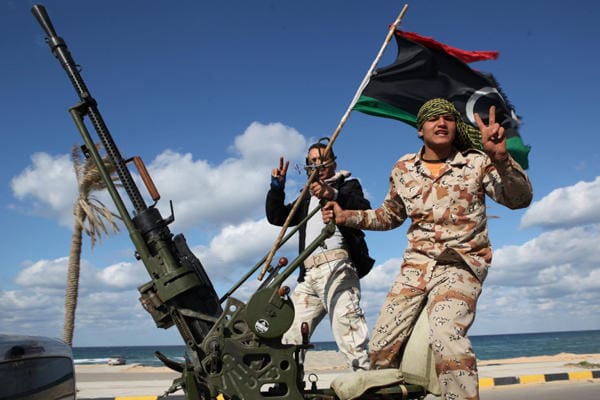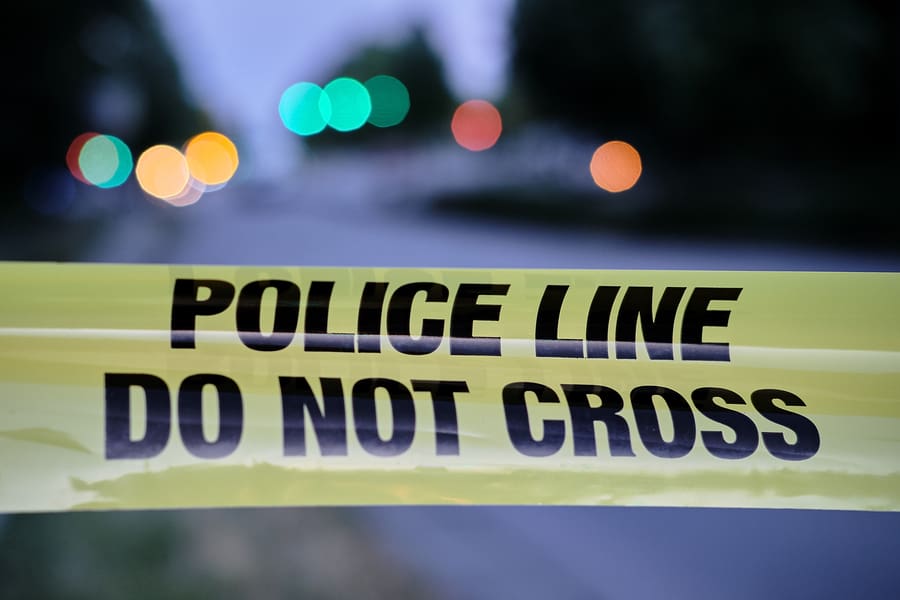For all their talk about “liberating” people to establish democracy, politicians value stability over freedom. One need only look south of our border to see how U.S. foreign policy has nothing to do with helping the common man regain his God-given rights. Uncle Sam supports one group of tyrannical thugs against another. What we should be doing: using our influence to restore Mexicans’ constitutional right to keep and bear arms. A report from the BBC on the newly liberated Libya illustrates the point perfectly . . .
Now the anger boiled over. The doctor and the security man squared up to each other in the tiny office, nose to nose.
We needed permission from the commander of the local brigade, shouted the fighter. What right did he have to walk into his office and tell him what to do, responded our doctor.
And so it went on, hands gesturing, arms flailing. Eventually the security man threatened to call in the “kateeba”, the men with the guns.
In Libya, the gun is the ultimate arbiter of disputes. It is not always used, as it was not in this case. Sometimes the mere threat is enough.
A few weeks ago, I went to check on reports that there was digging going on in Gaddafi’s former compound in Tripoli. The dictator’s gold, it is rumoured, lies hidden somewhere in the ground.
A group of men stopped me from entering.
On whose authority, I wanted to know?
“Authority?” the man in charge asked.
“Yes,” I said, “which ministry or government department has decreed that the BBC should be prevented from seeing your digging?”
“I don’t need any ministry,” said the man, patting his Kalashnikov. “This is my ministry.”
The media and the government constantly wring their hands about the “chaos” that emerges in the wake of a deposed tyranny. The fact that there are guns everywhere is a cause for alarm, to the point where we support disarmament in the name of peace (of course). Stability comes from the ballot box, not the point of a gun. Allegedly.
A recent csmonitor.com article embodies the meme. “Six months since the Libyan civil war ended in Muammar Qaddadi’s death, a new report from Amnesty International says hundreds of militias remain active in the country, extorting money and killing their enemies,” the subhead proclaims. And?
Libya’s revolutionaries aren’t the plucky underdogs fighting for freedom anymore. They’re the most powerful people in the country, at least for the moment, and some of them, according to the report, are doing horrific things with that power. Libya is currently planning elections for June, but it’s hard to imagine a fair or accountable process until the militias are brought under some kind of control.
Under control by who? To what end? In whose interest? And what’s the bet the CIA is in there, somewhere, playing favorite, stoking the fires of internecine bloodshed? To what end? Democracy? Liberty? Perhaps. Perhaps not.
Post-revolutionary chaos is the crucible inside of which freedom is forged. If and when individual liberty emerges from this horrific process in Libya, as it did in the United States, the Libyans won’t forget that their newfound rights rest on the bedrock of mutually assured destruction. Nor should we. As Patrick Henry warned . . .
Guard with jealous attention the public liberty. Suspect every one who approaches that jewel. Unfortunately, nothing will preserve it but downright force. Whenever you give up that force, you are ruined.
To wit: Mexico. Meanwhile, in Libya, even the man at the Beeb can’t help but perceive, however dimly, the fundamental truth of Henry’s words.
The day after that incident at the hospital, I sat in the warm morning sunshine talking to a man who has become something of a professional protester.
Every day he comes out on to one of Benghazi’s main squares to voice his displeasure at the failings of the local government, the power of the armed militias.
After listening to his litany of complaints, I asked him if he thought it had all been worth it. His face changed.
“Oh,” he said, “I feel like a different man now. I can breathe, I am free.”





As I look to the strongmen and thugs of the Middle East, I cast about for their Patrick Henry’s, their Madisons, their founders of a Just Society and the Rule of Law, and I don’t find them. Where are they? Digging up Qaddafi’s “gold”?
How blessed America was at a fragile moment that broke with all that was before. And all that’s since been, it would seem.
Devout Christians. Derisively reffered to as Puritans today.
Last I heard, Libya was going to groove on Shaaria law. So much for the Enlightenment.
We’re closer to Shariah law than you think. Start passing laws in the US based on any religion, say Catholicism, and you’ve just laid the groundwork.
Oh, dear…I think with Piss Christ, gay crèches/Anglican Bishops, and chiseling off of Ten Commandments from public buildings, an American theocracy is about as unlikely a worry to have as any.
I remain dubious of a theocracies’ threat to the United States. Thankfully, there are still rational people that know that the US was not founded as a christian nation and that religion has no place in American government. Not all agree, unfortunately.
To paraphrase and abbreviate Heinlein- There are two types of people in the world. Those who seek to control others, and those who have no such desire. The latter make nuch better neighbors.
You see in this world there’s two kinds of people, my friend. Those with loaded guns, and those who dig.
“The latter make nuch better neighbors.”
And better slaves.
So the only to positions to be filled, in the entire world, are master and slave?
Well yes.
A freeman is the man who is his own master. A slave has always been only a slave.
There will be free societies in Libya, Syria, Egypt and their ilk when water flows uphill.
You’re optimistic, then? Water runs uphill when it is pumped to overflowing at the bottom of a hill, if the valley (containing most of the people) is walled-in tightly enough.
Two points.
Human life is the cheapest commodity on this planet.
Wars are fought because that is human nature.
War is the relief valve that prevents us from all killing each other. That’s why nuclear war is avoided, it deprives us of the ability to do it personally, which is the whole point. If we really wanted no more wars, we would annialate our enemies, and some of our friends.
In the Middle East Democracy has been around for quite some time, as the Kalasnikov *is* the ballot box. Its 30 round magazine represents the votes, and the sight picture determines the political party affiliation.Much like less exciting forms of democracy , the minority party can still do great damage if they conserve their resources and shoot straight.
Well, it looks like it’s right back to the tyranny of the strong in Libya.
Same as it ever was.
While I don’t have much confidence that Libya will become a democratic, pluralistic nirvanna, a decentralized market state with Islamic tendencies may not be all that bad. If it has a murder rate 2x that of Mexico in 2 years, that’ll be progress.
Noting the Mexican example, here’s an excellent piece regarding the differences border, culture and an armed citizenry can make in murder rates:
http://reason.com/archives/2009/07/06/the-el-paso-miracle
i am not surprised, at all.
“the gun is the ultimate arbiter of disputes. It is not always used, as it was not in this case. Sometimes the mere threat is enough”: It’s true in DC, in NYC, in LA, and everywhere else in the world. “Civilized” people are those who respond to a mere threat, at least until the next election. These elections depend on an informed electorate, so they work out about like Deputy Smith’s CCW classes. I often feel the urge to join a clannish tribe, as Rahm Emmanuel’s did long ago. Herding sheep is much much harder than is commonly appreciated. One good ad run fifty times can throw an election. That’s how well grounded mass views are. As a matter of academic interest, I wonder when Rahm’s carry permit expires.
“meet the new boss…same as the old boss”
Comments are closed.